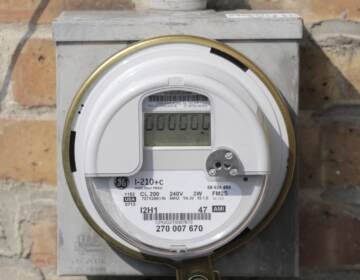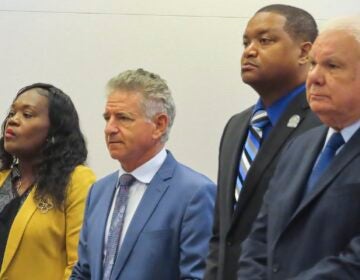Q&A with former EPA administrator Christie Todd Whitman on Trump’s budget cuts

File Photo: Former New Jersey Gov. Christie Todd Whitman at Pontefract, her home, Tuesday, June 21, 2016, in Tewksbury, N.J. (AP Photo/Mel Evans)
President Trump’s administration has proposed a federal budget that would cut the Environmental Protection Agency’s allotment by 31 percent, or $2.6 billion and the equivalent of 3,200 jobs.
On the chopping block are all climate change programs, including those meant to help coastal towns cope with sea level rise, as well as programs for pollution cleanup and increased energy efficiency.
According to former New Jersey Governor Christine Todd Whitman, head of the EPA (2001-2003) during the George W Bush Administration, New Jersey is among the states that would suffer most, for reasons big and subtle.
NewsWorks talked with the former governor for her take on the budget, and the future of the Jersey Shore.
NewsWorks: You wrote an op-ed for “The Atlantic” last week saying – in no uncertain terms – that Trump’s proposed budget cuts to the EPA will have dire consequences for human health. How bad is it for New Jersey, specifically? Given our population density, is a rollback of air and water protection more of a concern here than it might be elsewhere?
Whitman: Because we are the most populated state in the nation, it gets very intense. We’re producing our own pollution, and we’re also on the receiving end of the trade winds, which blow west to east. We saw a story today about premature births in Hunterdon County and along the western border because of air pollution from coal-fired power plants to the south and west of us. I could have shut down every industry when I was governor and still have had trouble meeting the Clean Air standards, not because of anything we were producing, but because of transport. Mother Nature does not care about geopolitical boundaries. That is why you need an overarching federal presence.
NewsWorks: Speaking of coal-fired plants, of the four that are left in Jersey, the two run by PSEG will be closed this June, and another may be converted to natural gas. Can Trump do as he promises and bring the coal jobs back?
Whitman: Not in the way he thinks. Coal is not closing down because of environmental regulations, but because of the low cost of natural gas — this is economics 101. He wants to do more fracking, more extraction of natural gas; that’s going to undermine the coal industry. And frankly, as far as carbon is concerned, the ship has left port. You have so many businesses understanding that carbon is bad for the atmosphere, and if you reduce your output, you give yourself an economic advantage because you differentiate from competitors. It’s interesting, as they go in for interviews this is what the millennial generation is asking about — a company’s environmental commitment. It’s having an impact on who businesses can hire.
NewsWorks: In February, the Pinelands Commission approved a 22-mile natural gas pipeline meant to convert the Beesly’s Point power station from coal to natural gas. You’ve gone on the record as being against the pipeline, since it would run through ten miles of protected Pinelands forest, one of the most ecologically sensitive areas in the nation. There’s another factor that’s gotten less air time: If this fracked gas infrastructure is put in place in Jersey — coupled with a relaxed regulatory climate — how likely is it that fracking will follow?
Whitman: That’s hard to say. It’s going to be a decision by the various utilities. I think it would see more pushback in New Jersey than most places, because there’s just not many spots where it can happen. The thing about fracking is that it can be done safely, but there are certain places where you can do it and certain places where you shouldn’t. An area where a spill could contaminate the water supply for tens of thousands of people is not a good place. And I’m not sure the economics today would encourage utilities to start doing that in New Jersey.
NewsWorks: Is there any EPA cut that makes you think: “Yea, ok, that program was bloated with bureaucracy, anyway. I’m on board with this change coming to New Jersey?”
Whitman: Not from what I’m seeing right now. When you go through the affected programs, New Jersey particularly gets hurt, because when you cut back 31 percent and you cut as much staff as they are proposing to cut, you lose the block grant programs, the community grant programs that local communities have used to clean up their water, and this is really important for New Jersey. You also lose oversight of superfund sites, and we have about 100 in New Jersey in various stages of cleanup. Some are virtually done, but they haven’t been finalized yet, and that’s going to stop. Then there’s brownfield sites, which are real eyesores because they’re located in downtowns. They’re not superfunds, but still need to be cleaned up. They tend to be old abandoned gas stations and things like this.
NewsWorks: The administration is saying the responsibility for superfund cleanup will simply roll over to the states. Are you saying states do not have the resources to take this on?
Whitman: Not to the degree it needs to be done, no. As for how long each cleanup will be delayed, that depends on how far along the site is, and whether a responsible party has been identified.
NewsWorks: Trump has proposed cutting $1 billion to the U.S. Army Corps of Engineers for beach replenishment. I live in Cape May, where the Army Corps has committed to replenish every two years, since it is jetties the Army Corps built that are responsible for the depletion of sand. How worried should we be if this money is cut from the budget?
Whitman: Well it’s obviously going to be a concern, because we’re just going to keep having storms — no question about that. There is going to be more nor’easters, more hurricanes. The real question is: How do we rebuild, and should we be rebuilding in the same places? At the end of the day, that is the unfortunate, difficult conversation we have to have, because sea level is rising. If we do rebuild, we have to understand we can’t build in some places the way we have before. But — to the extent we can have beach replenishment give us some time to do that planning — we need it.
NewsWorks: I recently spoke with a coastal defense researcher who said that, unless we pay millions to raise it up or levee it off like New Orleans, the Jersey Shore will cease to exist in 75 years because of the rate of sea level rise. Having seen the data — is this a real possibility?
Whitman: Sure. Yea, it is. Absolutely. Right now, if you go down to Florida in Coral Gables, they have mapped the entire city, they have determined how sea level is going to affect them, what businesses will have to move, where they’re going to stage it, and what it’s going to cost. They’ve done it because they have flooded parking lots with fish swimming in them during high tides. I just finished co-chairing a report on an Arctic task force for the Council on Foreign Relations, and when you spend some time in the Arctic, that’s the canary in the coal mine. They’re already having to move some 13 native villages, with another 30 needing to move soon. Where do you put them? How do you move them? Do you move the hospital first? Or the school or the houses? It’s very complicated and we need to take it seriously, and we need to give ourselves time. We’re not going to stop climate change — the climate’s been changing since the earth was formed — but we are clearly exacerbating a natural trend to the point where nature can no longer absorb it. And we need to cut back on what we’re putting into the atmosphere so we can meet these challenges that are coming. No matter what we do, they’re coming.
NewsWorks: So if these cuts go through, and climate action effectively halts for four or eight years, is the Jersey shore past the point of no return?
Whitman: Well, I hate to say that. I know scientists will say yes, we’re going to get to that point. But I’m always reluctant to say it because Mother Nature has proven so adept at healing herself, as long as we give her a chance. We’ve seen it with the hole in the ozone layer, but it’s going to be much more difficult. The loss of property — the loss of life — is going to be enormous if we don’t do something.
NewsWorks: Proposed budget cuts to the EPA eliminate $9.5 million to water quality testing, including water quality testing for New Jersey beaches. Last summer, this information was used to close a beach in Sandy Hook due to high bacteria levels, and nearly 20 others in Jersey were put under advisory. If this cut passes, what happens this summer? Do we find that money elsewhere? Or is it every tourist for herself?
Whitman: Well, beach fees are probably going to go up. Tourism is the second largest part of our economy, and the shore is a huge part of that, so we need to get back to cleaning up the waterways. A lot of the problem now is sanitary sewer and septic sewer overflows, and we need to get back to providing money for cleanup. People are going to be upset by what they find when they get to the shore.
NewsWorks: So, more expensive beach tags. Can we quantify how else these proposed cuts to the EPA would undercut New Jersey’s economy?
Whitman: You can see that pressure is going to be put on municipalities to try to handle beaches on their own, or handle sanitary and septic overflows on their own, which means the ratepayers are going to pay more, local taxes will go up, and certainly you’ll see health impacts from dirty air and water. The problem is cost avoidance. It’s very hard to get people to understand and fully appreciate: If you spend money now, it’s going to cost a lot less over time.
NewsWorks: Trump’s budget provides no increase in funding for water infrastructure, and it cripples the ability of the agency to enforce drinking water standards. It also cuts grants to states for lead cleanup by 30 percent. In January, lead was found in the water of 21 New Jersey school districts. So how do we prevent another water crisis like we saw in Flint and Newark?
Whitman: As with most states on the East Coast, New Jersey’s water infrastructure is aging. Groundwater contamination and runoff are also issues. That’s why you need a strong environmental ethos both at the state and federal level to stay on top of these things. The other thing is a dirty little secret no one wants to hear about: We don’t pay enough for water. A lot of people assume clean water comes out of the sky, so why pay for it? But these people aren’t thinking — if you go outside after a rain and look at your car, you’ll notice this water is not pristine, because there’s a lot of particulate matter in the air. At the end of the day, the needs of water infrastructure are such that no one part of government can meet them on its own. It can’t just be the burden of the rate payer and utility, the municipality or the state and federal government. It has to be a combination. We’re going to have to get creative.
NewsWorks: Trump’s proposal will likely see changes. What’s the one thing you’re hoping Congress alters before it passes this budget? In other words, what’s the most devastating piece for New Jersey?
Whitman: The real thing that scares me, and I hope they look at across the board, is science. We are cutting science everywhere in the federal budget, and undermining the public’s confidence in science. We need science to raise the bar, to continue to define new things that are acceptable or not acceptable for human health. We cannot stop the science progress, yet that’s exactly what we’re doing.
NewsWorks: How high are the stakes in the upcoming gubernatorial election in New Jersey?
Whitman: Oh, I think they’re very high from an environmental perspective. Don’t forget you are talking about the strongest governorship in the country, so the governor has a lot of power and so it becomes really important that he or she cares about the environment, because their ability to impact is enormous.
NewsWorks: Even if Trump’s administration rolls back land, air and water regulations at the federal level, isn’t it true our next governor could pass laws affording more protection than some of the federal legislation ever did? So, maybe we don’t hit the panic button yet?
Whitman: That is true, provided that the administration doesn’t do what it’s been threatening to do with California — making it illegal for states to be more protective. That’s mindless, especially if you’re a big believer in states’ rights, which Trump says he is. That’s exactly what he should want — for states to make their own decisions about how protective they are of their constituents.
NewsWorks: Is there hope for progress, or has the environment become an issue too entangled in partisan politics?
Whitman: Back in 1970, when the Environmental Protection Agency was established, that’s when you were having riots on college campuses, you had cities burning because of race riots and you had the women’s movement — there was a lot going on in this country. And yet, it happened because the public stood up and said: We’re tired of rivers bursting into flames and air so dirty you can see it. They forced Congress to act, and they forced Republican president Richard Nixon to work with a democratic congress to write the Clean Air Act and the Clean Water Act. The public has to stand up and say: We care, and this is enough.
NewsWorks: For people on both sides of the aisle who are worried about what cuts to the EPA will mean in New Jersey, what can be done?
Whitman: I just just did a thing [on Tuesday] with [Executive Director of the New Jersey Conservation Foundation] Michelle Byers. We’re working on an initiative to rally the congressional delegation to observe standards on the environment and fight these changes. We need to get the public behind that. The people have to tell their representatives they care. Otherwise, it won’t happen, because this administration is not going to be a champion. Take a look at what’s being asked, sign on, and send it to your representatives.
Christine Todd Whitman is the President of The Whitman Strategy Group (WSG), a consulting firm that specializes in energy and environmental issues. Governor Whitman served in the cabinet of President George W. Bush as Administrator of the Environmental Protection Agency from January of 2001 until June of 2003. She was Governor of the State of New Jersey from 1994 until 2001.
WHYY is your source for fact-based, in-depth journalism and information. As a nonprofit organization, we rely on financial support from readers like you. Please give today.





